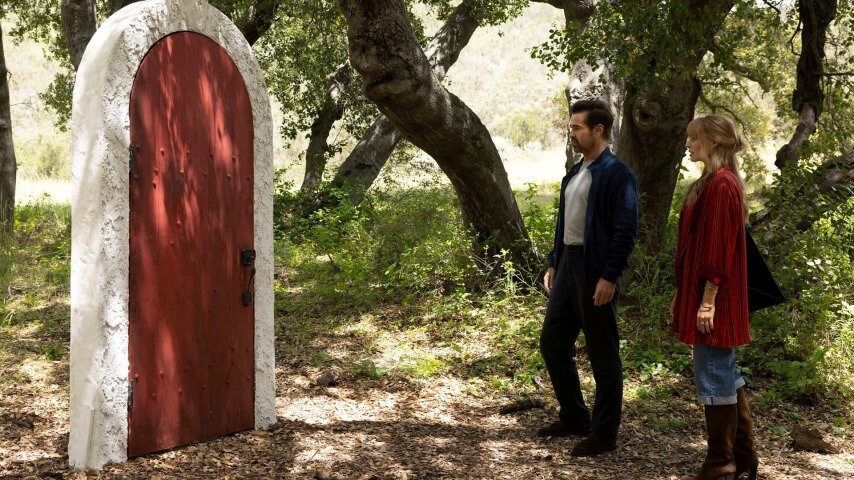Margot Robbie and Colin Farrell's twee Big Bold Beautiful Journey depends on chemistry
Kogonada lends his fantastical romance an uncommon delicacy. Too bad about the script.
Photo: Sony
Oh, to be great-looking, charming, and avoidant of relationships out of reluctance to hurt the other person because you consider yourself broken. It’s a problem most prevalent in Movie World, nearly as debilitating as being great-looking, charming, and prone to solitude; together, these hang-ups may be insurmountable for A Big Bold Beautiful Journey. Not within the movie, mind. There, it seems pretty obvious that Sarah (Margot Robbie; avoidant of relationships) and David (Colin Farrell; prone to solitude) may be capable of overcoming their flimsy psychological issues. The film itself, however, risks irreparable harm through its series of screenwriterly excuses for not kissing right away. It’s a romantic fantasy so delicate of spirit that seemingly no one has had the heart to tell it when it’s dithering over absolutely nothing.
Who wants to bear that bad news, though, when the fantasy elements of A Big Bold Beautiful Journey are depicted with rare sweetness? This measured tone comes courtesy of director Kogonada, who made the Linklater-ish walk-and-talk Columbus and the thoughtful sci-fi picture After Yang. If not for some swearing designed to introduce a little irreverence into the proceedings, the story of Sarah and David could be a PG affair. (Columbus is the rare indie that went out unrated seemingly to avoid that half-extinct MPAA designation, rather than something harsher.) It’s not even really a story, per se, but a series of mild, emo adventures crossing the deadpan magical realism of Charlie Kaufman with those scenes in Annie Hall where the characters stroll through scenes of their childhood.
Sarah and David meet at the wedding of unnamed mutual friends, introduced as fellow residents of an unnamed mutual city. They flirt, in a melancholy fashion, and go their separate ways, until a pair of suspiciously interactive GPS systems bring them back together. They’ve been set up, somehow, through a mechanism that the movie has the good sense not to belabor. David and Sarah have both obtained last-minute cars from the same strange, empty-warehouse rental company staffed with Kevin Kline (so restrained it may take a moment to register that it’s him) and Phoebe Waller-Bridge (so shticky it’s impossible to mistake her for anyone else), who insist on including GPS, in case their phones crap out. Once they’ve been manipulated into eventually sharing a single car (and, in poor Farrell’s case, made to suffer the humiliation of saying the film’s title aloud), the GPS guides the pair through the scenic countryside to a series of stand-alone doors.
One magically transports them to David’s high school, during his teenage years. One whisks them into an art museum that Sarah used to visit. They learn about each other’s pasts, which are convincing to a point. Somehow, the doors only ever need to show scenes that contribute directly to the characters’ psychology, specifically as it affects romantic relationships. Despite that wedding invitation, Sarah and David rarely show each other, or even mention, things like friends, or non-immediate family, or workplace acquaintances. Or jobs. Do jobs exist this world?
 Keep scrolling for more great stories.
Keep scrolling for more great stories.
